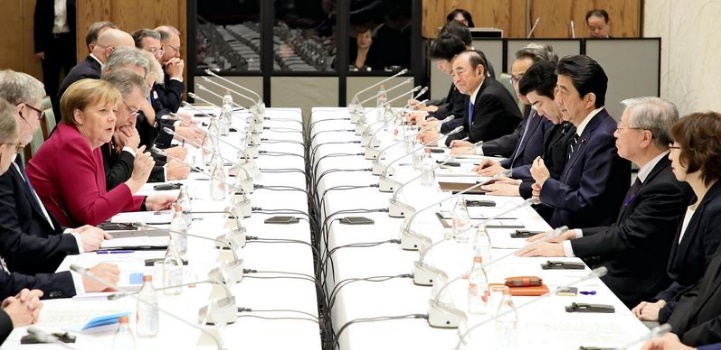Sharing mutual wariness of China, Abe and Merkel pledge to cooperate on security, economy
TOKYO — Prime Minister Shinzo Abe and German Chancellor Angela Merkel agreed Monday that both countries would promote bilateral cooperation on both the security and economic fronts.
By beefing up its relations with Germany, a core member of the European Union (EU), Japan aims to share its sense of wariness over China, which is increasing its influence.
At a joint press conference held after her talks with Abe, Merkel made clear her support for realizing a “free and open Indo-Pacific,” a scheme being advocated by the Abe administration. She said that the plan is engaged in promoting peace and stability in the Indo-Pacific region and her country would also support Japan to that end. Then she added that this scheme is also related to China’s territorial ambitions.
Germany is said to have attached importance to its relations with China in recent years. While this marks her fifth visit to Japan, on previous visits she had often visited China as well. This time, she is only visiting Japan. A government official explained that “Germany aims to show, both at home and abroad, that the country is maintaining an appropriate distance from China.”
During the talks, Abe and Merkel confirmed that the two countries would boost joint research on autonomous driving and artificial intelligence (AI). A delegation of German business leaders, including Joe Kaeser, the chief executive officer of Siemens AG, is accompanying Merkel during her visit, demonstrating Germany’s keen interest in cooperating with Japan.
Article continues after this advertisementLying behind this is the rise of Chinese enterprises in advanced technology, such as information technology. There are concerns about China increasing its market dominance in the IT sector, through excessive protection of its industries, and also over technology leakage and adverse impacts on security, for instance.
Following their summit talks on Monday, Abe and Merkel attended a meeting of business leaders from both countries. Saying with emphasis that the era of “5G,” the next-generation mobile network technology, has come, Merkel raised the question of what is needed to prevent the Chinese government from eventually collecting and harnessing vast amounts of data. By saying this, Merkel expressed her hope for cooperation between both the Japanese and German governments and private companies of both countries.
